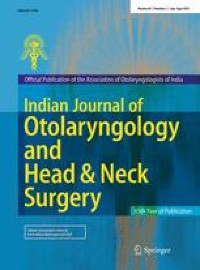|
Αρχειοθήκη ιστολογίου
-
►
2023
(256)
- ► Φεβρουαρίου (140)
- ► Ιανουαρίου (116)
-
►
2022
(1695)
- ► Δεκεμβρίου (78)
- ► Σεπτεμβρίου (142)
- ► Φεβρουαρίου (155)
-
▼
2021
(5507)
- ► Δεκεμβρίου (139)
- ► Σεπτεμβρίου (333)
-
▼
Ιουλίου
(491)
-
▼
Ιουλ 05
(34)
- The impact of vestibular schwannoma and its manage...
- Impact of COVID-19 pandemic on the incidence of ot...
- Three-dimensional measurement and analysis of botu...
- Patient-reported outcome and cost implication of a...
- Systematic review of reporting quality of economic...
- Malignant struma ovarii: From case to analysis
- A Feasible, Low-Cost, Capsicum and Tomato Model fo...
- A Feasible, Low-Cost, Capsicum and Tomato Model fo...
- Voice symptoms in teachers during distance teachin...
- Patient reported outcome measures in a cohort of p...
- Surgical management of female genital mutilation-r...
- Primary Laryngeal Granulocytic Sarcoma: A Case Report
- Pericranial and scalp rotation flaps for occipitoc...
- Delayed subaponeurotic fluid collection on an infa...
- Factors associated with cerebrospinal fluid leak a...
- Apocrine Hidrocystoma of the Parotid Gland
- A Rare Cause of Red Tympanic Membrane: Jugular Bul...
- An Unusual Case of a Pharyngeal Fistula to the Cer...
- Simultaneous Sudden Hearing Loss and Peripheral Fa...
- Atypical Carcinoid of the Larynx: A Case Report
- Effect of Methimazole Therapy on Thyroid Pathohist...
- Thyroid-Associated Ophthalmopathy after Radioactiv...
- Extent of Surgery and the Prognosis of Unilateral ...
- PVR-AFM: A Pathological Voice Repair System based ...
- Risk stratification in differentiated thyroid canc...
- Cochlear Implant in Klippel-Feil Syndrome: Challen...
- A single centre's experience of 23 cases of total ...
- JianpiQinghua granule reduced PPI dosage in patien...
- Comparison of Endoscopic Endonasal Approach and La...
- History, Variations, and Extensions of the Retrosi...
- The Asterion-to-Transverse Process of the Atlas Li...
- Endonasal Endoscopic and Hybrid Surgery Techniques...
- LncRNA MSC‐AS1 motivates the development of melano...
- Immunohistochemical markers for histopathological ...
-
▼
Ιουλ 05
(34)
- ► Φεβρουαρίου (628)
-
►
2020
(1810)
- ► Δεκεμβρίου (544)
- ► Σεπτεμβρίου (32)
- ► Φεβρουαρίου (28)
-
►
2019
(7684)
- ► Δεκεμβρίου (18)
- ► Σεπτεμβρίου (53)
- ► Φεβρουαρίου (2841)
- ► Ιανουαρίου (2803)
-
►
2018
(31838)
- ► Δεκεμβρίου (2810)
- ► Σεπτεμβρίου (2870)
- ► Φεβρουαρίου (2420)
- ► Ιανουαρίου (2395)
-
►
2017
(31987)
- ► Δεκεμβρίου (2460)
- ► Σεπτεμβρίου (2605)
- ► Φεβρουαρίου (2785)
- ► Ιανουαρίου (2830)
-
►
2016
(5308)
- ► Δεκεμβρίου (2118)
- ► Σεπτεμβρίου (877)
- ► Φεβρουαρίου (41)
- ► Ιανουαρίου (39)
Αλέξανδρος Γ. Σφακιανάκης
ΩτοΡινοΛαρυγγολόγος
Αναπαύσεως 5
Άγιος Νικόλαος Κρήτη 72100
2841026182
6032607174
Δευτέρα 5 Ιουλίου 2021
A Feasible, Low-Cost, Capsicum and Tomato Model for Endoscopic Sinus and Skull Base Surgery Training
Εγγραφή σε:
Σχόλια ανάρτησης (Atom)



Δεν υπάρχουν σχόλια:
Δημοσίευση σχολίου